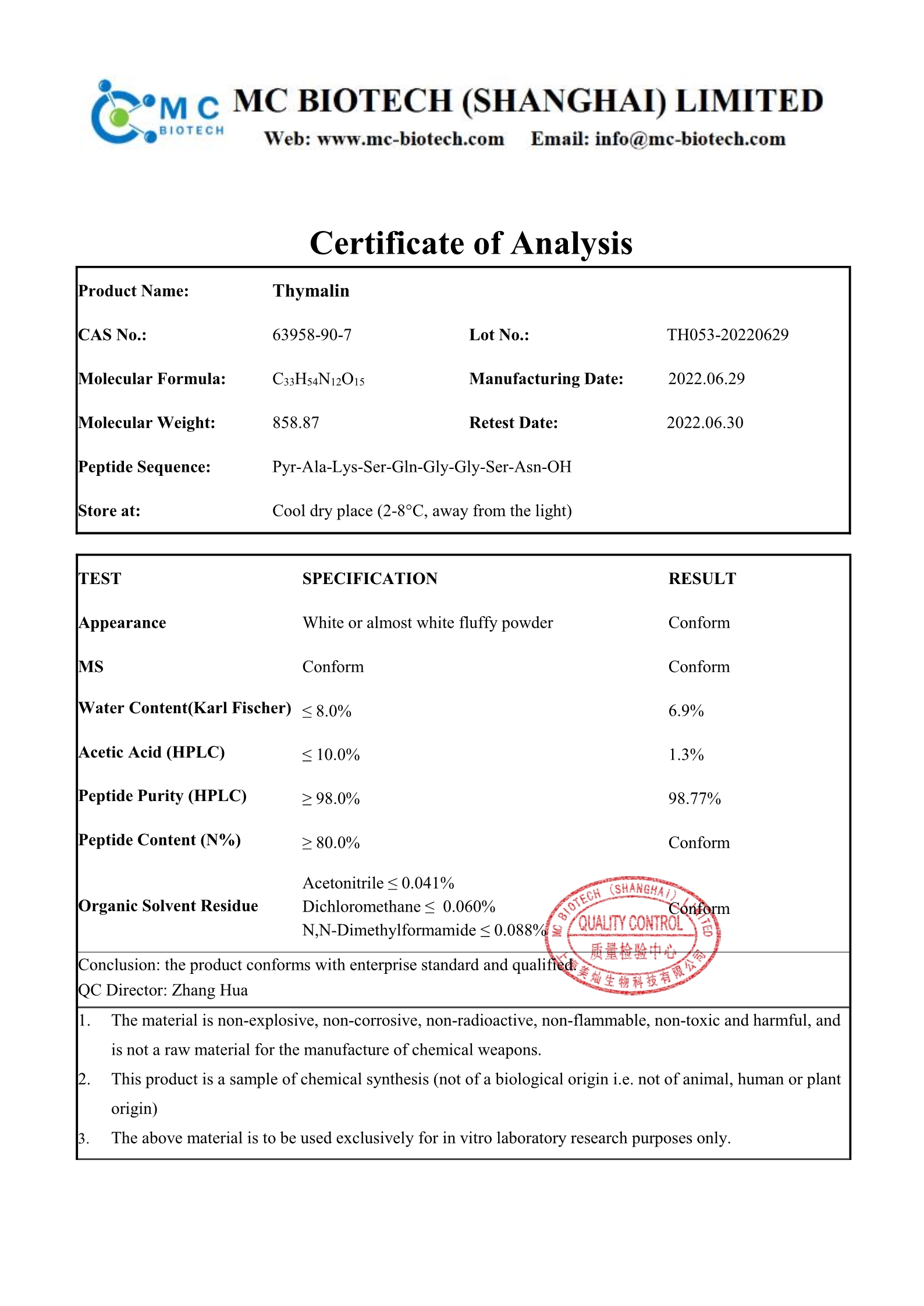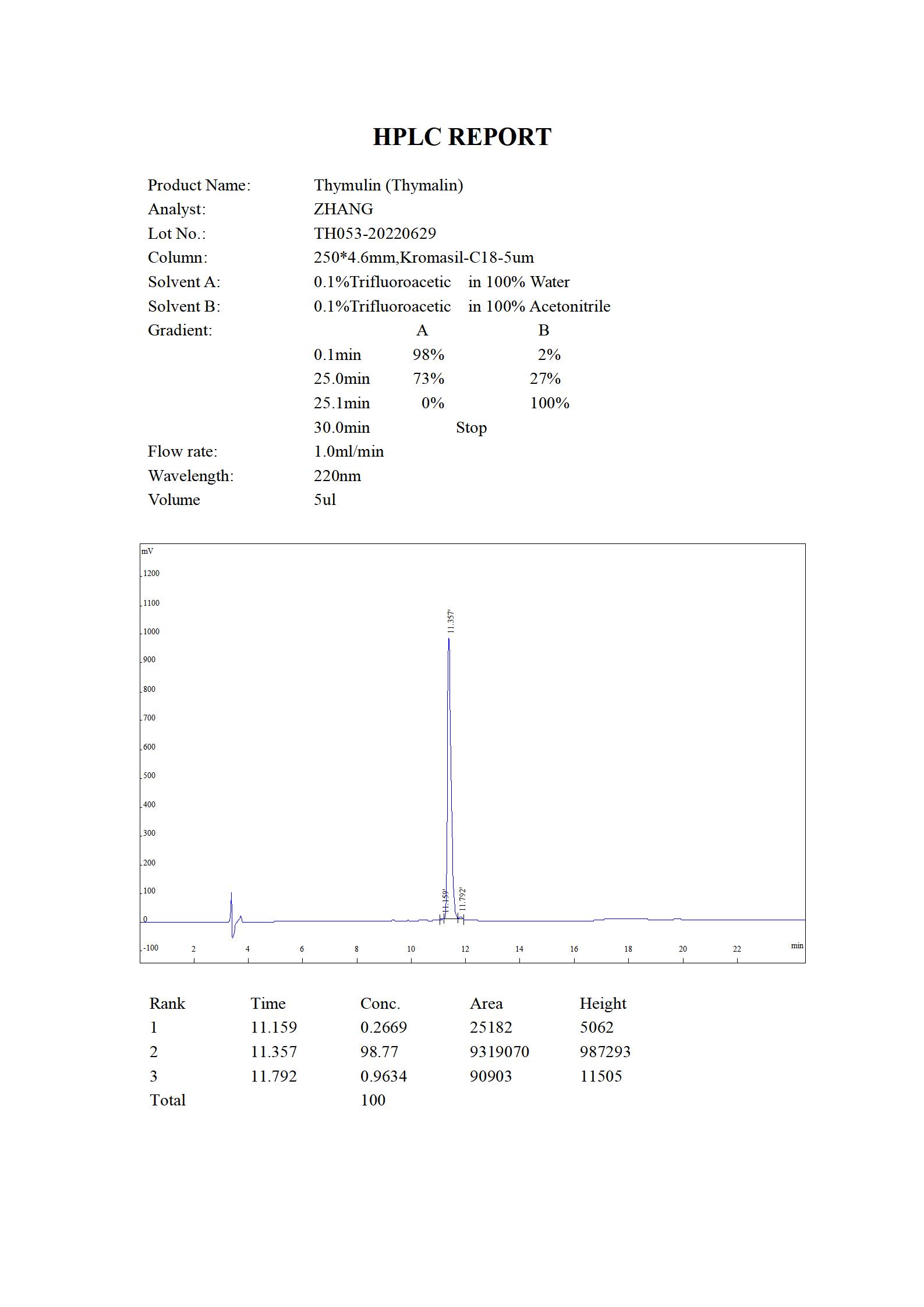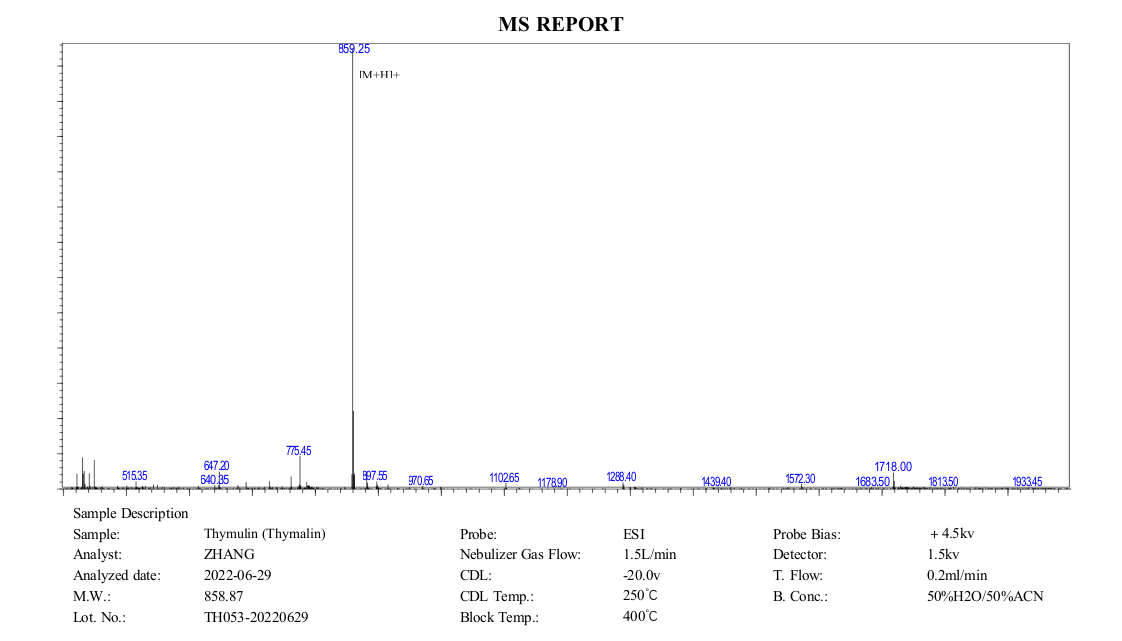Research shows that Thymalin may be effective in boosting immune function, fighting heart disease, and regulating sleep-wake cycles. It is also of interest in aging research for its ability to reduce all-cause mortality in mouse models and prolong lifespan.

Name: Thymulin; Thymalin; SERUM THYMIC FACTOR
CAS No.: 63958-90-7
Peptide Sequence: Pyr-Ala-Lys-Ser-Gln-Gly-Gly-Ser-Asn
Molecular Formula: C33H54N12O15
Molecular Weight: 858.85
Appearance: White Lyophilized powder



Thymalin is the synthetic version of thymulin, which was isolated from the thymus in 1977. Thymalin regulates development of various cells of the adaptive immune system including T-cells and natural killer (NK) cells. It also plays a role in inflammatory signaling in the neuroendocrine system. Thymalin has target receptors on astrocytes, which make up 20-40% of cells in the brain and act to support nervous tissue via nutrient provision, repair, and by providing structure. Researchers have speculated that thymalin and its analogs may hold the key to understanding inflammation in neurodegenerative diseases like Parkinson’s and ALS.
Thymalin has also been observed to play a role in anorexia[1]. It is not clear if depleted thymalin levels in anorexia are a primary contributor to the condition or a consequence of malnutrition and thus a secondary contributor to the adverse effects of anorexia. Currently, the research suggests that thymalin supplementations may help to ward off the negative effects of anorexia.
Thymalin is of primary interest to researchers for its ability to alter the development of T-cells and NK cells. By understanding how thymalin produces its effects on these critical immune system components, researchers hope to develop targeted therapies for boosting immune function[2]. One potential application of thymalin involves boosting the natural immune response to disease processes. Research in rats infected with a specific parasite has found that thymalin administration boosts levels of circulating antibodies against the parasite[3]. These findings could be of use in people with immune dysregulation (e.g. HIV, severe combined immune deficiency), helping to boost diminished natural immunity.
Thymalin research has also been of intense interest in oncology. It is well-known that tumors can evade most natural mechanisms that would normally destroy them, particularly natural killer cells. A deeper understanding of how thymalin affects NK cells could lead to novel therapeutics to fight malignancy. Recent research in rats suggests that thymalin, even at lower than therapeutic doses, can reduce tumor growth by as much as 78%[4].
One interesting branch of thymalin research arose almost entirely by accident following the observation that thymalin improves the structure and function of skin in aging rats. Further investigation of this phenomenon revealed that T-cell differentiation occurs in the epithelium and mucosa of the skin, digestive tract, and respiratory system[5], [6]. This suggests that T-cell differentiation is more complex and nuanced than once thought and has opened several avenues of research into immune modulation, aging, and skin health. Studies into the effects of thymalin in the skin have also helped to reveal some of the more general age-related changes caused by alterations in immune function.
Thymalin is a short, naturally occurring nonapeptide found in the thymus of most mammals. Thymalin follows a circadian rhythm of excretion, similar to that of other hormones affected by the function of the pineal gland. Thymalin is one of the hormones requiring zinc to be biologically active.
It isn’t clear what thymalin’s primary function is. It is known to play a role in the development of mature T-cells and natural killer cells. Thymalin is also modulates inflammatory signaling via cytokines. The peptide is highly active in the central nervous system and has target receptors on astrocytes.
Thymalin has been used in the past to investigate the role of immune modulation in patients suffering from infiltrative tuberculosis. Infiltrative tuberculosis is almost uniformly fatal and does not respond well to antibiotic treatment. Research indicates that the efficacy of antibiotic treatment regimens is improved with the addition of thymalin[7]–[9]. This is of particular importance now that multi-drug-resistant tuberculosis has become a widespread problem. There is hope that thymalin can not only improve cure rates, but reduce both the duration of time that treatment must take place (upwards of 6 months to a year with standard antibiotic therapies) and reduce the amount of time that individuals must remain in isolation.
Research into the effects of thymalin on tumor growth and malignancy have revealed positive, if complicated results. Essentially, thymalin boosts cellular immunity in the setting of cancer, but does not yield any long-term changes in outcome[10]. These findings, while disappointing, are not entirely unexpected. The immune response to malignancy is complicated and untangling the nuances of the process will take. Thymalin may not be the silver bullet in the case of cancer, but it is almost certain to play a role in complex chemotherapeutic regimens of the future. Understanding how it functions in the setting of cancer is critical to understanding and, eventually, manipulating the body’s own defenses to boost their cancer fighting activity.
Individuals suffering from anorexia have very low circulating levels of thymalin. They are also known to be prone to infection and illness. Scientists have suggested that extreme malnutrition combined with hormonal disturbances may be the cause of low thyamlin levels in anorexia[1]. There is some thought that supplementation of thymalin in these individuals may help to boost cellular immunity and ward off complications. A similar logic could be applied to any condition that affects nutrition, including cancer, HIV, and other serious, chronic medical conditions.
It has long been known that thymalin levels decrease with age. The decrease in thymalin levels can be directly and indirectly linked to changes in various measures of health status including blood pressure, bone density, heart disease, and respiratory disease. Research into the benefits of thymalin supplementation have suggested that all-cause mortality is reduced by the peptide. In fact, studies in animals indicate that long-term thymalin supplementation may reduce risk of death by a factor of 2.5[11]. This is one of the most profound effects observed in anti-aging studies.
Most thymulin used in early research was isolated from calf thymus or other animal sources. This is an inherently risky process and one that produces limited quantities of very costly peptide. Recent research into the use of synthetic di-, tri-, and tetra-peptide derivatives of thymalin has indicated that these shortened, synthetic versions of the natural protein can produce some or all of the same effects. In particular, shortened analogues of thymalin have been observed to induce changes in lymphocyte differentiation, cytokine signaling, and T-cell function[12].
[1] S. Wade et al., “Thymulin (Zn-facteur thymique serique) activity in anorexia nervosa patients,” Am. J. Clin. Nutr., vol. 42, no. 2, pp. 275–280, Aug. 1985.
[2] T. A. Kuznetsova, N. N. Besednova, T. S. Zaporozhets, T. P. Smolina, A. K. Kazha, and L. A. Ivanushko, “[Comparative study of immunomodulatory activity of peptides, tinrostim and thymalin],” Antibiot. Khimioterapiia Antibiot. Chemoterapy Sic, vol. 58, no. 11–12, pp. 8–12, 2013.
[3] J. Hermánek and J. Prokopic, “Influence of thymic preparations on the result of experimental infection with Taenia crassiceps (Zeder, 1800) in ICR mice.,” Folia Parasitol. (Praha), vol. 36, no. 4, pp. 331–340, 1989.
[4] G. V. Zhukova, A. I. Schikhlyarova, T. A. Barteneva, A. N. Shevchenko, and F. M. Zakharyuta, “Effect of Thymalin on the Tumor and Thymus under Conditions of Activation Therapy In Vivo,” Bull. Exp. Biol. Med., vol. 165, no. 1, pp. 80–83, May 2018.
[5] Z. S. Khlystova, I. I. Kalinina, and S. P. Shmeleva, “New data on the involvement of ectodermal epithelium in extrathymic differentiation of human T-lymphocytes,” Bull. Exp. Biol. Med., vol. 138, no. 2, pp. 194–197, Aug. 2004.
[6] Z. S. Khlystova, I. I. Kalinina, S. P. Shmeleva, O. P. Ryabchikov, and V. K. Khavinson, “Age-related changes of thymalin content in human epidermis,” Bull. Exp. Biol. Med., vol. 133, no. 6, pp. 620–622, Jun. 2002.
[7] L. A. Ivanova, “[The use of thymalin in the combined chemotherapy of patients with infiltrative destructive pulmonary tuberculosis],” Vrach. Delo, no. 10, pp. 57–59, Oct. 1989.
[8] A. A. Maslennikov, V. F. Kamenev, and V. M. Kolomiets, “[Immunological correction in progressive pulmonary tuberculosis],” Probl. Tuberk. Bolezn. Legk., no. 9, pp. 30–33, 2007.
[9] L. S. Kogosova, E. F. Chernushenko, I. G. Il’nitskiÄ, S. I. Goncharova, A. E. Markov, and L. V. Kuchugura-Kucherenko, “[Effectiveness of administration of thymalin in the complex treatment of pulmonary tuberculosis],” Probl. Tuberk., no. 10, pp. 29–32, 1990.
[10] E. V. Bakhidze and J. Bokhman, “Application of thymic factor ‘Thymalin’ in complex treatment of endometrial cancer patients.,” Eur. J. Gynaecol. Oncol., vol. 11, no. 4, pp. 251–256, 1990.
[11] V. K. Khavinson and V. G. Morozov, “[Geroprotective effect of thymalin and epithalamin],” Adv. Gerontol. Uspekhi Gerontol., vol. 10, pp. 74–84, 2002.
[12] V. G. Morozov and V. K. Khavinson, “Natural and synthetic thymic peptides as therapeutics for immune dysfunction,” Int. J. Immunopharmacol., vol. 19, no. 9, pp. 501–505, Sep. 1997.
Product use: This product is only for research chemicals.
Contact: Sophia Wang
Phone:
E-mail: info@mc-biotech.com
Add: 2nd Floor,ECNU Science Park,No.1006 Jinshajiang Road, Putuo District, Shanghai